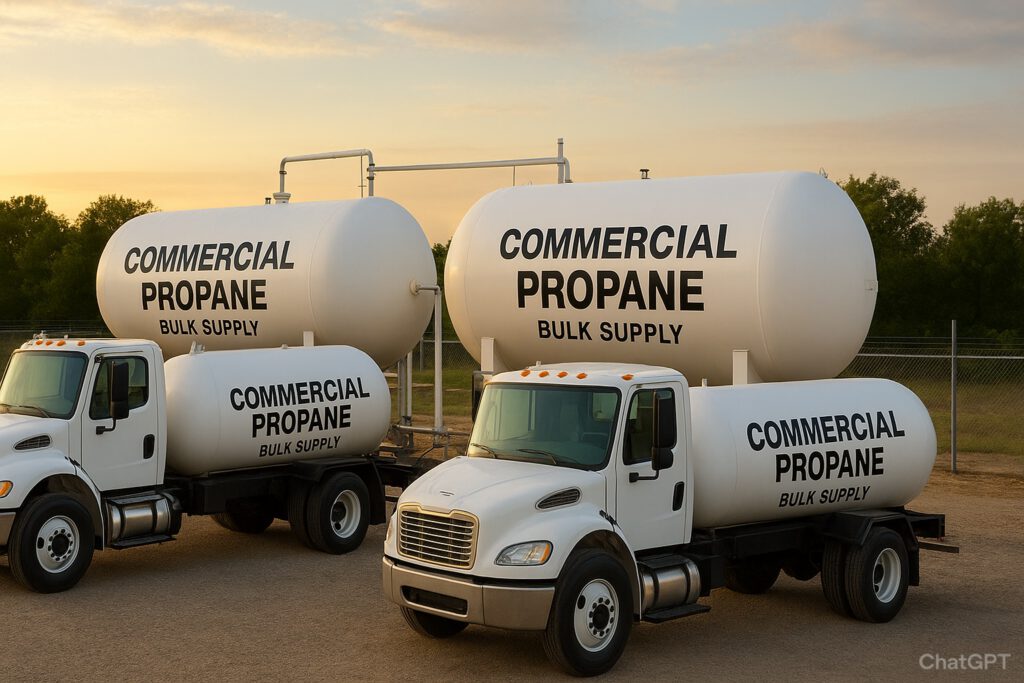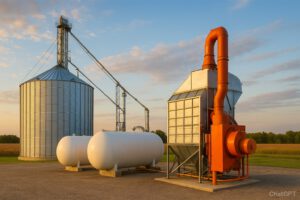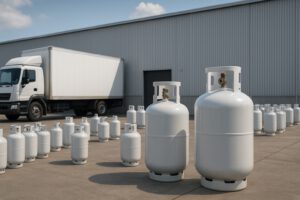
Large-scale commercial operations require reliable, cost-effective energy solutions that ensure uninterrupted fuel supply while optimizing operational expenses. Commercial propane contracts with volume pricing, automatic delivery systems, and dedicated account management provide businesses with the fuel security and cost predictability essential for successful operations.
Understanding bulk propane supply arrangements, contract structures, and account management services helps commercial operators secure competitive pricing, reliable delivery, and comprehensive support for their propane energy needs.
Understanding Commercial Propane Contracts
Commercial propane contracts differ significantly from residential agreements, offering volume-based pricing and service levels designed for business operations with substantial fuel requirements.
Contract Types and Structures
Different contract arrangements accommodate various business models and operational requirements, from fixed-term agreements to flexible supply arrangements.
Fixed-Term Contracts
- Multi-year agreements: 1-5 year commitments with guaranteed pricing
- Volume commitments: Minimum purchase requirements for discounted rates
- Price protection: Locked-in rates regardless of market fluctuations
- Termination clauses: Exit options for changing business needs
Flexible Supply Agreements
- Month-to-month options: Short-term arrangements for variable needs
- Variable volume pricing: Tiered rates based on consumption levels
- Seasonal adjustments: Pricing that reflects demand fluctuations
- Performance incentives: Rewards for consistent high-volume usage
Comprehensive Service Contracts
- Full-service packages: Supply, delivery, maintenance, and support
- Equipment leasing: Tank rental included in contract pricing
- Emergency services: 24/7 support and backup fuel availability
- Account management: Dedicated representatives and reporting
Volume Pricing and Cost Optimization
Commercial contracts leverage volume purchasing to provide significant cost savings compared to retail pricing, with pricing structures that reward larger consumption levels.
Pricing Structures
Volume-based pricing offers multiple tiers and incentives that reduce costs as consumption increases, providing substantial savings for large operations.
Tiered Volume Pricing
- Base tier pricing: Standard commercial rates for moderate volumes
- Volume discounts: Reduced rates for higher consumption levels
- Seasonal incentives: Additional savings during off-peak periods
- Loyalty programs: Long-term customer discount structures
Cost Components
- Base fuel cost: Per-gallon propane pricing
- Delivery fees: Transportation and handling charges
- Service charges: Account management and administrative fees
- Equipment costs: Tank rental or purchase financing
Cost Analysis and Savings
Commercial contracts provide measurable financial benefits through volume purchasing and efficient service delivery.
Savings Calculations
- Volume discount impact: Percentage savings versus retail pricing
- Total cost of ownership: Comprehensive operational expense analysis
- Competitive benchmarking: Comparison with alternative fuel options
- ROI projections: Financial benefits over contract duration
Automatic Delivery and Supply Chain Management
Automated delivery systems ensure uninterrupted fuel supply while optimizing logistics and reducing manual intervention in the supply chain.
Automated Delivery Systems
Sensor-based monitoring and automated ordering eliminate fuel shortages while ensuring optimal inventory management.
Smart Tank Monitoring
- Level sensors: Real-time fuel level tracking
- Usage analytics: Consumption pattern analysis
- Automatic reordering: System-triggered delivery requests
- Weather integration: Seasonal demand forecasting
Delivery Scheduling
- Predictive ordering: AI-driven delivery optimization
- Route optimization: GPS-based delivery routing
- Time window management: Scheduled delivery during optimal hours
- Emergency protocols: Priority delivery for critical situations
Supply Chain Reliability
Commercial contracts ensure fuel availability through multiple supply chain protections and contingency planning.
Reliability Features
- Backup supply agreements: Alternative fuel sources during shortages
- Regional distribution: Multiple supply points for redundancy
- Inventory reserves: Strategic fuel stockpiling
- Emergency response teams: Rapid deployment for supply disruptions
Dedicated Account Management
Large commercial accounts receive personalized service through dedicated account managers who understand business operations and provide proactive support.
Account Manager Services
Dedicated account managers serve as single points of contact, providing comprehensive support for all propane-related needs.
Relationship Management
- Primary contact: Dedicated representative for account needs
- Regular check-ins: Proactive communication and support
- Business understanding: Knowledge of operational requirements
- Issue resolution: Priority handling of concerns and problems
Support Services
- Usage analysis: Detailed consumption and cost reporting
- Contract optimization: Recommendations for better terms
- Equipment recommendations: Upgrades and efficiency improvements
- Training coordination: Staff education and safety programs
Reporting and Analytics
Comprehensive reporting provides visibility into fuel usage, costs, and operational efficiency for data-driven decision making.
Performance Reports
- Consumption tracking: Detailed usage by location and time period
- Cost analysis: Breakdown of expenses and savings opportunities
- Efficiency metrics: Performance indicators and benchmarks
- Environmental reporting: Emissions and sustainability metrics
Custom Analytics
- Trend analysis: Historical patterns and forecasting
- Comparative data: Performance versus industry benchmarks
- Optimization recommendations: Data-driven improvement suggestions
- Custom dashboards: Tailored reporting interfaces
Bulk Supply Infrastructure
Commercial operations require specialized infrastructure for handling large volumes of propane safely and efficiently.
Tank and Storage Solutions
Bulk storage systems accommodate commercial-scale fuel requirements with safety and accessibility features.
Large-Scale Tanks
- Above-ground installations: 500-10,000+ gallon capacity tanks
- Underground systems: Concealed storage for property aesthetics
- Multiple tank configurations: Redundant systems for reliability
- Modular designs: Scalable capacity for growing operations
Storage System Features
- Safety valves: Pressure relief and emergency venting
- Leak detection: Continuous monitoring and alarm systems
- Insulation options: Temperature control for consistent fuel quality
- Access controls: Security features for commercial installations
Distribution Networks
Efficient fuel distribution systems ensure reliable delivery from storage tanks to usage points throughout commercial facilities.
Piping Infrastructure
- Commercial piping: High-capacity distribution systems
- Pressure regulation: Consistent delivery pressure throughout facility
- Zone isolation: Segmented systems for maintenance and safety
- Expansion capabilities: Designed for future facility growth
Flow Control Systems
- Automated valves: Remote operation and emergency shutdown
- Flow monitoring: Real-time usage tracking by area
- Pressure management: Consistent delivery across varying demands
- Backup systems: Redundant controls for operational continuity
Risk Management and Compliance
Commercial contracts include comprehensive risk management and regulatory compliance measures to protect business operations.
Risk Mitigation
Multiple layers of protection safeguard against fuel supply disruptions, price volatility, and operational risks.
Supply Security
- Diversified suppliers: Multiple fuel sources for redundancy
- Strategic reserves: Emergency fuel stockpiling
- Contract flexibility: Options for changing supply arrangements
- Force majeure protection: Coverage for uncontrollable events
Price Risk Management
- Fixed pricing options: Protected against market fluctuations
- Hedging strategies: Financial instruments for price stability
- Volume guarantees: Minimum purchase commitments
- Repricing mechanisms: Periodic contract adjustments
Regulatory Compliance
Commercial contracts ensure adherence to all applicable regulations and industry standards.
Environmental Compliance
- Emission reporting: Regulatory compliance documentation
- Leak prevention: Required monitoring and maintenance programs
- Sustainability initiatives: Green energy transition support
- Waste management: Proper disposal of equipment and materials
Safety Standards
- NFPA compliance: National fire protection standards
- DOT regulations: Transportation and storage requirements
- OSHA requirements: Workplace safety and training
- Local ordinances: Municipal and state regulations
Contract Negotiation and Terms
Understanding contract terms and negotiation strategies ensures businesses secure favorable commercial propane agreements.
Key Contract Elements
Commercial contracts include specific terms that define the relationship between supplier and customer.
Core Provisions
- Term length: Contract duration and renewal options
- Pricing structure: Rate schedules and adjustment mechanisms
- Volume commitments: Minimum purchase requirements
- Termination clauses: Exit conditions and penalties
Service Level Agreements
- Delivery guarantees: Response times and reliability commitments
- Quality standards: Fuel specifications and testing requirements
- Support availability: Hours and response time commitments
- Performance metrics: Service quality measurements
Negotiation Strategies
Effective negotiation maximizes contract value while maintaining positive supplier relationships.
Preparation Steps
- Market research: Understanding competitive pricing and terms
- Usage analysis: Detailed consumption and requirement assessment
- Alternative evaluation: Comparing multiple supplier options
- Business case development: ROI projections and cost-benefit analysis
Negotiation Tactics
- Volume leverage: Using consumption levels for better terms
- Relationship building: Developing long-term partnership approaches
- Performance incentives: Negotiating bonuses for service excellence
- Flexibility options: Building in contract adjustment mechanisms
Technology Integration
Modern commercial contracts incorporate advanced technology for enhanced service delivery and operational efficiency.
Digital Platforms
Online platforms provide convenient access to account management, ordering, and support services.
Customer Portals
- Account dashboard: Real-time usage and cost monitoring
- Online ordering: Digital delivery scheduling and modifications
- Document access: Contract terms, invoices, and reports
- Support ticketing: Issue tracking and resolution
Mobile Applications
- Remote monitoring: Smartphone access to tank levels and usage
- Emergency ordering: Mobile delivery requests
- Payment processing: Secure mobile payment options
- Communication hub: Direct contact with account managers
Data Analytics and AI
Advanced analytics provide insights for optimizing fuel usage and operational efficiency.
Predictive Analytics
- Consumption forecasting: AI-driven usage predictions
- Maintenance scheduling: Equipment service optimization
- Price optimization: Optimal purchasing timing recommendations
- Risk assessment: Supply disruption prediction and mitigation
Future of Commercial Propane Supply
Evolving technologies and market dynamics are transforming commercial propane supply arrangements.
Industry Trends
The commercial propane sector is adapting to new technologies and sustainability requirements.
Digital Transformation
- IoT integration: Comprehensive equipment networking
- Blockchain contracts: Secure digital agreement management
- AI optimization: Automated supply chain management
- Remote operations: Virtual account management capabilities
Sustainability Focus
- Renewable propane: Bio-based fuel transition options
- Carbon tracking: Emissions monitoring and reduction
- Efficiency programs: Energy optimization initiatives
- Green certifications: Sustainability compliance programs
Making the Right Contract Choice
Selecting the optimal commercial propane contract requires evaluating business needs, market conditions, and supplier capabilities.
Assessment Framework
Systematic evaluation ensures businesses select contracts that align with operational requirements and financial objectives.
Business Analysis
- Consumption patterns: Historical and projected fuel usage
- Budget constraints: Investment capacity and cash flow considerations
- Risk tolerance: Comfort level with price and supply volatility
- Growth projections: Future expansion and changing requirements
Supplier Evaluation
- Service reputation: Reliability and customer satisfaction ratings
- Market presence: Geographic coverage and supply network
- Technology capabilities: Digital services and monitoring options
- Financial stability: Long-term viability and investment in infrastructure
Implementation Strategy
Successful contract adoption requires careful planning and execution to maximize benefits.
Transition Planning
- Current contract review: Exit terms and transition requirements
- System integration: Equipment and infrastructure compatibility
- Staff training: New system and process education
- Communication plan: Internal stakeholder notification
Performance Monitoring
- KPI establishment: Success metrics and measurement criteria
- Regular reviews: Quarterly contract performance evaluations
- Optimization opportunities: Continuous improvement identification
- Relationship management: Ongoing supplier partnership development
Next Steps
Begin optimizing your commercial propane supply with professional assessment and contract evaluation.
- Conduct usage audit: Analyze current consumption and cost patterns
- Request proposals: Obtain competitive contract offers
- Consult experts: Work with energy procurement specialists
- Develop strategy: Create comprehensive fuel management plan
Commercial propane contracts with volume pricing, automatic delivery, and dedicated account management provide businesses with the fuel security, cost optimization, and operational efficiency essential for competitive success in today’s demanding marketplace.
About Jennifer Whitaker
Propane industry expert and content contributor for MyPropane.com.
View all posts by Jennifer Whitaker →Related Articles

Propane Grain Drying Systems: Agricultural Solutions
Sep 17, 2025 • 8 min read
Discover efficient propane-powered grain drying systems for agricultural processing. Learn about cost-effective drying solutions, energy optimization, and modern grain handling…

Commercial Propane Cylinders: Business Applications Guide
Sep 18, 2025 • 9 min read
Discover commercial propane cylinders for business applications. Learn about cylinder types, DOT regulations, safety features, and proper handling for commercial…